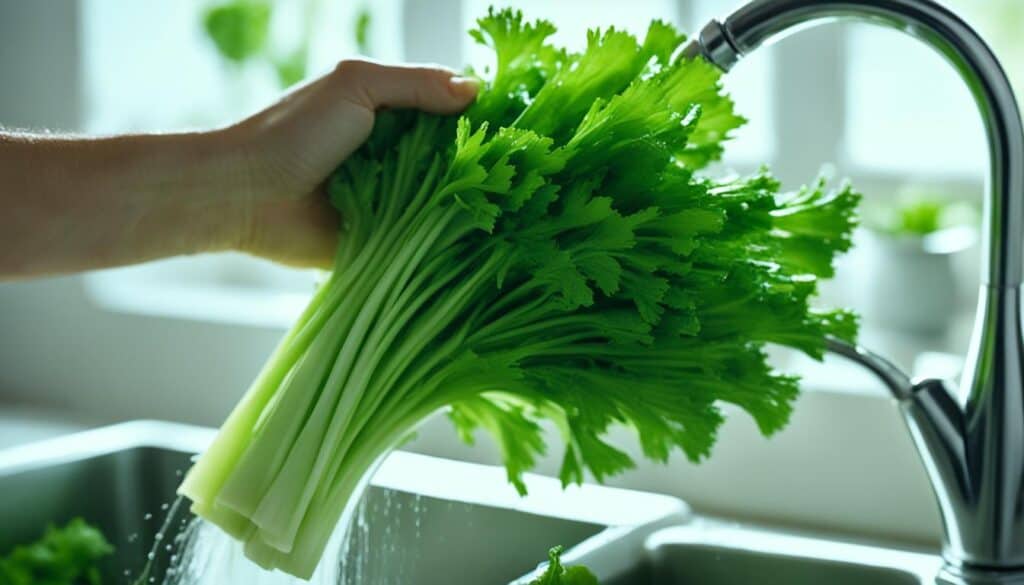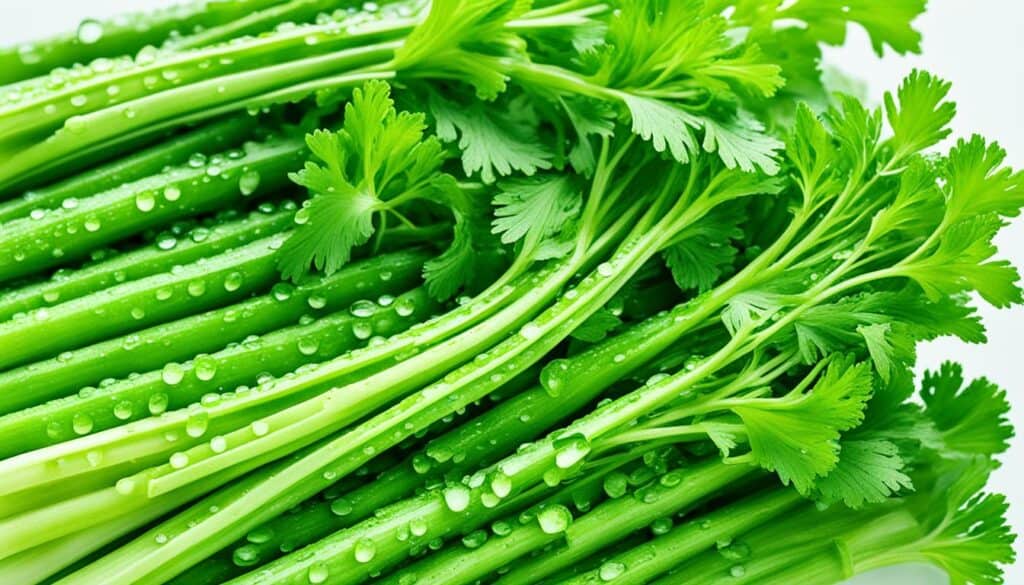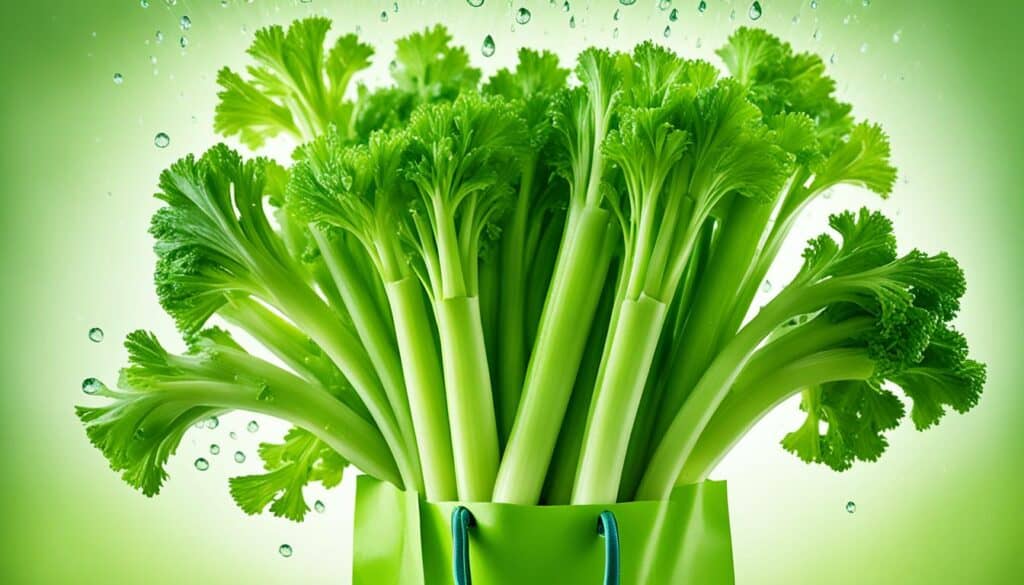Did you know that Chinese celery is not just a variety of celery but also a popular culinary herb in Chinese cuisine? This leaf celery, with its distinct flavor and thick, yellowish stems, is a staple ingredient in many traditional dishes. But Chinese celery isn’t just about taste. It also offers a range of health benefits that make it a valuable addition to your vegetable garden and kitchen.
Key Takeaways:
- Chinese celery is a variety of celery with thick, yellowish stems that is widely used in stir-fries, soups, and salads.
- It is rich in vitamins A, B, C, and D, as well as iron and potassium.
- Chinese celery promotes urination, reduces blood pressure, stimulates the appetite, aids digestion, relieves constipation, and prevents scurvy.
- When buying Chinese celery, look for thick, crisp stalks with vibrant, unwilted leaves.
- Chinese celery should be consumed in moderation by those with certain health conditions such as diarrhea or stomach ulcers.
Types of Chinese Celery
Chinese celery comes in three different types based on growth conditions: Pond celery, Field Chinese celery, and Western celery. Each type has its own unique characteristics and flavors.
Pond Celery
Pond celery is known for its small stems and serrated green leaves. Although less common than other varieties, it offers a distinct taste and adds flavor to various dishes.
Field Chinese Celery
Field Chinese celery is the most well-known type of Chinese celery. It features thick, yellowish stems and leaves with a strong taste. This variety is commonly used in Chinese cuisine and adds a distinct flavor to stir-fries, soups, and salads.
Western Celery
Western celery, also known as Pascal celery, has fleshy, crunchy pale green stems. While it may not have the same strong taste as Chinese celery, it is still a popular choice for salads and snacking.
| Type of Chinese Celery | Description | Flavor | Common Uses |
|---|---|---|---|
| Pond Celery | Small stems, serrated green leaves | Distinct | Various dishes |
| Field Chinese Celery | Thick, yellowish stems, strong taste | Strong | Stir-fries, soups, salads |
| Western Celery | Fleshy, crunchy pale green stems | Mild | Salads, snacking |
Health Benefits of Chinese Celery
Chinese celery is a remarkable vegetable known for its various health benefits and curative properties. Incorporating Chinese celery into your diet can have a positive impact on your overall well-being. Let’s explore some of the incredible health benefits that Chinese celery has to offer:
- Reduces Blood Pressure: Chinese celery is believed to have the ability to lower blood pressure, making it beneficial for individuals with hypertension or at risk of cardiovascular diseases.
- Stimulates Appetite: If you’re struggling with a poor appetite, Chinese celery can help stimulate your taste buds and increase your desire to eat.
- Aids Digestion: The high fiber content in Chinese celery promotes healthy digestion, preventing constipation and supporting regular bowel movements.
- Relieves Constipation: Chinese celery acts as a natural laxative, providing relief from constipation and improving overall digestive health.
- Promotes Weight Loss: Incorporating Chinese celery into a balanced diet can aid in weight loss efforts due to its low-calorie content and high fiber content, which helps you feel full for longer.
- Cleanses the System: Chinese celery possesses cleansing properties, helping to eliminate toxins from the body and improve overall detoxification processes.
- Prevents Scurvy: Scurvy is a condition caused by a deficiency in vitamin C. Chinese celery is rich in vitamin C, making it an excellent addition to your diet to prevent scurvy.
By harnessing the curative and supplementing properties of Chinese celery, you can optimize your health and well-being. This versatile vegetable has a range of benefits that can positively impact various aspects of your body’s functioning.
“Incorporating Chinese celery into your diet can have a positive impact on your overall well-being.”
Cooking with Chinese Celery
Chinese celery is a versatile ingredient that adds a unique flavor to various dishes. Here are some recipe ideas and culinary uses to explore:
1. Stir-fry:
In a hot skillet, heat oil and add minced garlic, diced pork, and Chinese celery. Stir-fry until the ingredients are cooked through, and the flavors are well combined. Serve with steamed rice for a delicious and quick meal.
2. Steamed fish with Chinese celery:
Place a fresh fish fillet on a plate and top it with sliced Chinese celery, ginger, and scallions. Steam the fish until it is tender and flakes easily. The combination of flavors from the fish, Chinese celery, and aromatic ingredients creates a delightful and healthy dish.
3. Chinese celery soup:
Create a comforting soup by adding sliced Chinese celery, carrots, tofu, and chicken broth to a pot. Simmer until the vegetables are tender and the flavors have melded together. This nourishing soup is perfect for cold days or when you crave a light, yet satisfying meal.
These recipe ideas illustrate the versatility of Chinese celery in different cooking methods. Whether you prefer the crunchiness in a stir-fry, the delicate flavor of steamed fish, or the comforting warmth of a soup, Chinese celery adds a unique touch to your culinary creations.
Selection and Storage of Chinese Celery
When it comes to buying Chinese celery, it’s important to choose stalks that are thick, crisp, and visually appealing. Look for vibrant green leaves that are unwilted, indicating freshness. To ensure you’re selecting the best Chinese celery, follow these simple tips:
- Look for thick, crisp stalks
- Choose vibrant, unwilted leaves
Once you have purchased your Chinese celery, it’s essential to store it correctly to maintain its freshness and flavor. Follow these storage tips for optimal results:
- Remove any coarse outer strings from the celery stalks
- Thoroughly wash the celery under cool, running water
- Dry the celery thoroughly using a clean kitchen towel or paper towel
- Store the celery in a tightly sealed plastic bag
- Place the bag in the refrigerator
With proper storage, unused Chinese celery can last for several weeks, allowing you to enjoy its delicious flavor and nutritional benefits over an extended period.
| Selection Tips | Storage Tips |
|---|---|
| Choose thick, crisp stalks | Remove coarse outer strings |
| Look for vibrant, unwilted leaves | Wash and dry thoroughly |
| Store in a sealed plastic bag in the refrigerator |
By following these simple steps, you can ensure that your Chinese celery stays fresh for longer, making it a delicious and nutritious addition to your meals.
How to Handle Chinese Celery
When it comes to handling Chinese celery, there are a few key steps to ensure its freshness and quality. Follow these simple cleaning and preservation methods to make the most of your Chinese celery:
1. Removing Damaged Leaves and Stems
Start by inspecting the Chinese celery for any damaged or wilted leaves and stems. Gently remove them to ensure that only the fresh and healthy parts are used.
2. Rinsing Under Cool Water
Place the Chinese celery under cool, running water. Rinse it thoroughly to remove any dirt or debris that may be present on the leaves and stems. This will help ensure that your celery is clean and ready to use.
3. Using a Vegetable Brush
For a thorough cleaning, use a vegetable brush to scrub the celery gently. Pay extra attention to the base and root end of the celery, as this is where dirt and bacteria tend to accumulate. The vegetable brush will help remove any stubborn dirt or residue.
4. Drying and Wrapping
After rinsing and scrubbing, it’s important to dry the celery thoroughly. Excess moisture can accelerate spoilage. Pat the celery dry with a clean kitchen towel or paper towel. For optimal freshness, wrap the celery in a damp paper towel before storing it in a plastic bag. The damp paper towel will help maintain the celery’s moisture content and prevent it from drying out.
5. Blanching for Extended Shelf Life
If you want to extend the shelf life of your Chinese celery, consider blanching it before storage. Blanching involves boiling the celery for 1-2 minutes and then transferring it to ice water to stop the cooking process. Blanching helps preserve the color, texture, and flavor of the celery, making it last longer in the refrigerator.
By following these cleaning methods, preserving techniques, and storage tips, you can ensure that your Chinese celery stays fresh and ready to use for your next culinary creation.
Chinese Celery Dietary Taboos
While Chinese celery offers numerous health benefits, it is important to be aware of some dietary taboos associated with its consumption. Understanding these considerations will allow individuals to make informed choices about incorporating Chinese celery into their diet.
Digestive Problems
Individuals with digestive problems should consume Chinese celery in moderation to avoid potential discomfort such as bloating and gas.
Kidney Disease
Chinese celery, with its high potassium content, is not recommended for individuals with kidney disease. Consulting with a healthcare professional is advisable to determine the most suitable diet for managing the condition.
Blood-Thinning Medications
People taking blood-thinning medications, such as anticoagulants, should exercise caution and avoid Chinese celery. Coumarins present in Chinese celery can interfere with the effectiveness of these medications.
Hypertension
For individuals with hypertension, it is important to moderate the consumption of Chinese celery due to its potential blood pressure-lowering effects. Maintaining a balanced diet and consulting with a healthcare professional is crucial for managing blood pressure.
History of Kidney Stones
Individuals with a history of kidney stones should refrain from consuming Chinese celery as it contains oxalates that can contribute to the formation of kidney stones. It is advisable to opt for alternative vegetables with lower oxalate levels.
It is advisable to consult with a healthcare professional or a registered dietitian for personalized advice based on individual health conditions, medications, and dietary requirements.
Nutritional Value of Chinese Celery
Chinese celery is a nutritious vegetable that offers a variety of health benefits. It is rich in water content, dietary fiber, vitamins, minerals, and antioxidants, making it a valuable addition to any diet.
One 4-inch stalk of Chinese celery contains approximately 0.1g of dietary fiber. While this may seem like a small amount, incorporating Chinese celery into your meals can contribute to overall fiber intake, aiding in digestion and promoting a healthy gut.
In addition to fiber, Chinese celery provides small amounts of key vitamins and minerals. Here is a breakdown of some of the essential nutrients found in Chinese celery (per 4-inch stalk):
- Vitamin K: Supports blood clotting and bone health.
- Folate: Important for cell growth and development.
- Vitamin A: Essential for vision, immune function, and skin health.
- Potassium: Regulates blood pressure and supports heart health.
- Vitamin C: Boosts the immune system and acts as an antioxidant.
Furthermore, Chinese celery contains beneficial plant compounds such as apigenin and luteolin. These compounds have antioxidant properties, helping to neutralize harmful free radicals and protect cells from oxidative damage.
Overall, Chinese celery is a nutritious and versatile vegetable that can enhance your daily diet. Whether you enjoy it raw in salads or cooked in stir-fries, soups, or steamed dishes, Chinese celery provides a range of healthful nutrients.
Next, let’s explore the various health benefits of celery as a whole and discover more reasons why you should incorporate it into your meals.
Health Benefits of Celery
Celery is a powerhouse vegetable that offers a range of health benefits. From its anti-inflammatory and antibacterial properties to its potential in cancer prevention, celery is a versatile addition to your diet.
The health benefits of celery can be attributed to its unique composition of plant compounds. One important compound found in celery is apigenin, which possesses potent anti-inflammatory, antibacterial, antiviral, and antioxidant properties. These properties make celery an excellent food choice for supporting a healthy immune system.
“Apigenin, a compound found in celery, has been shown to have anti-inflammatory and antioxidant effects, which may help protect against chronic diseases.”
Celery also contains another beneficial compound called luteolin, which has been studied for its potential anticancer properties. Luteolin has shown promise in promoting programmed cell death in cancer cells and reducing inflammation.
Studies have explored the role of celery in preventing liver disease, urinary tract obstruction, and various inflammatory conditions. Its high antioxidant content helps neutralize free radicals and protect cells from damage.
Additional Health Benefits of Celery:
- Promotes heart health by lowering blood pressure and reducing inflammation
- Supports digestive health by aiding in digestion and relieving constipation
- May contribute to weight loss efforts due to its low caloric content and high fiber content
- Offers neuroprotective effects by stimulating neurogenesis
Adding celery to your meals and snacks is an easy way to incorporate its health benefits into your daily routine. From salads and stir-fries to soups and smoothies, the versatility of celery allows for various culinary creations.
Remember to wash and handle celery properly to ensure its freshness and minimize the risk of contamination. With its numerous health benefits and delicious flavor, celery is a valuable addition to a healthy and balanced diet.
Conclusion
Chinese celery is a versatile vegetable that not only adds flavor to your dishes but also provides various health benefits. With its ability to reduce blood pressure and stimulate the appetite, it can be a valuable addition to your diet. Whether you use it in stir-fries, steamed dishes, or soups, Chinese celery adds a unique taste and texture.
When cooking with Chinese celery, remember to handle it carefully and store it properly to maintain its freshness. Clean the celery thoroughly, removing any damaged leaves and stems, and store it in a sealed plastic bag in the refrigerator. By following these simple steps, you can enjoy the wonders of Chinese celery for longer.
It’s important to note that Chinese celery may not be suitable for everyone. Those with certain dietary restrictions or allergies should be mindful of their consumption. Additionally, individuals with specific health conditions, such as kidney disease or digestive problems, should consume Chinese celery in moderation. Always consult with a healthcare professional if you have any concerns.
In conclusion, Chinese celery offers a world of culinary possibilities and health benefits. Whether you’re looking for recipe ideas or seeking to explore its nutritional value, this Chinese celery guide has provided valuable information to help you make the most of this versatile vegetable. So, go ahead, get creative in the kitchen, and enjoy the many benefits that Chinese celery has to offer!










Leave a Reply